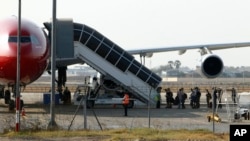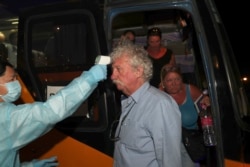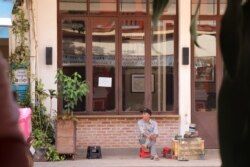Tourism sector insiders have expressed some hesitation at the government’s announcement to make foreign tourists pay $3,000 upfront, to compensate for any potential COVID-19 treatment costs, which could be a deterrent for incoming travelers.
The Ministry of Economy and Finance on Tuesday released a price list of costs that will be imposed on travelers visiting the country, including COVID-19 testing, hotel stay, transportation, and food costs. Tourism sector operators worry that these costs would deter tourists from coming to Cambodia, with the sector already facing massive economic hardship due to the novel coronavirus pandemic.
In March, the government had announced that foreigners entering the country were expected to have a medical certification that they did not have COVID-19, at least $50,000 in health insurance, and would have to enter 14-day isolation on entry into the country.
"Upon arrival to Cambodia, all foreign travelers will have to present their health insurance... and make a deposit (by cash or credit card) of USD 3,000 with designated commercial banks at points of entry," the Finance Ministry statement read.
The ministry listed out every small expense involved, including a $3 charge for security guards at quarantine facilities, $5 to transport passengers to a designated area to await their test results. The heavier charges include $100 per COVID-19 test, with a minimum of four tests, and $30 each for hotel stay and food during a passenger’s stay at a designated quarantine center.
The government is also charging a hefty $1,500, half the total upfront payment, for any potential cremation services. Incoming passengers will be expected to pay this money on arrival, with it being unclear who would be responsible for the money or how it was stored and accounted for. The statement only said local banks will be used to collect the money.
The move is a departure from Prime Minister Hun Sen’s statement in March that Cambodia would bear the costs of any COVID-19 positive patient, attempting to set the country apart from other countries who were charging foreigners for treatment.
The government had also embraced a “Small Country, Big Heart” campaign when it accepted the MS Westerdam cruise ship in February, which had been denied entry to multiple countries for fears it could be COVID-19 cluster. The passengers were given accommodation at a luxury hotel in Phnom Penh as they waited for their test results and even taken on a tour of the city by the municipality.
Finance Ministry spokesperson Meas Soksensan said on Thursday the decision to charge foreign travelers and the pricing list set had been released after studying the issue.
“Can VOA Khmer tell me which country treats foreigners free of charge?” he said.
The move could exasperate the issues facing Cambodia’s tourism sector, which is one of the main drivers of the economy. The difficult decision to open up to foreign travelers is not unique to Cambodia, and multiple countries are attempting to grapple with how to resume international travel and tourism, to prop up their sagging economies.
According to VN Express, Vietnam is considering restarting international air routes and is formulating a plan to bring tourists into the country as well. According to Asahi Shimbun in Japan, the country is also planning to allow business travelers from specific countries that have low case counts. Japan would test people on arrival, limit their movements to places of business but prevent them from using public transportation.
Bloomberg News reported that Thailand plans to have bilateral agreements with countries to allow international movement of travelers, but would restrict movements within the country to “travel bubbles.”
Chhay Sivlin, the president of the Cambodia Association of Travel Agents (CATA), welcomed guidelines for testing travelers to prevent the spread of the virus in Cambodia, but that the prices presented by the government were high and could be a deterrent to potential visitors.
“[It] should be half [the price] for testing for COVID-19,” she said, adding some foreigners entering the country had complained they were being charged arbitrary prices for testing, ranging between $200 to $300.
Chhay Sivlin said the government should lift the suspensions on visa-free entry, tourist visas, e-visas, and visas on arrival as visas. She added that there were some 630,000 Cambodians who were economically linked to the tourism sector, which had seen loss jobs and income.
Travel sector veteran Ho Vandy said the measures, while needed, would be skeptical of the $3,000 charge, adding that Cambodians traveling overseas would also be deterred if their destination country asked for $3,000 on arrival.
“It is the same if Cambodians traveling abroad are required to deposit [$3,000], they don’t feel comfortable,” he said. “It can curb their travels.”
Khek Norinda, a communications officer at the Phnom Penh International Airport, said there were only three arrivals and five departures on Thursday.
Whereas on Wednesday, he said 1,720 people were moving through the airport, both arrivals and departures, which was low compared to 28,300 inbound and outbound passengers for the same day in 2019.
“We don’t have the breakdown between inbound and outbound at this point. There are regular flights to Chinese cities and Seoul and one charter flight to Manila,” he said.
However, Institut Pasteur du Cambodge has said it can test up to 600 people a day, with the National Institute of Public Health able to do around 200 tests a day, according to government statistics from April.
Duong Veasna, deputy head of virology at Institut Pasteur du Cambodge, said they had tested samples for free so far and had purchased more reagent that is needed to test for the virus.
“We have ordered more reagent to prepare for the increase in samples,” he said, speaking to journalists on a media tour at the testing facility on June 4. “We plan to organize the test for COVID-19 for some people who need to go abroad. It is not for all public.”






